Rush Limbaugh: How he used shock to reshape America
- Published
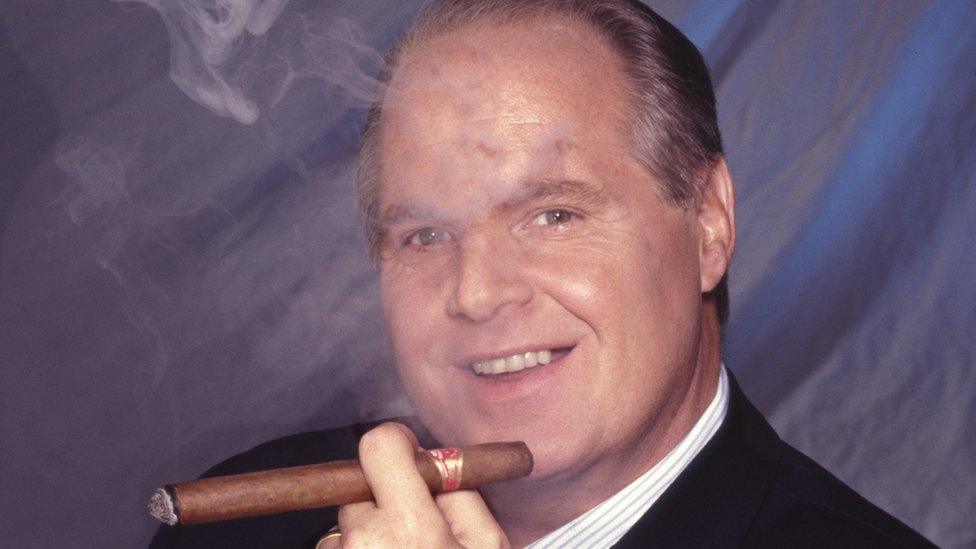
Rush Limbaugh's career was riddled with controversial moments that brought him praise from the conservatives and disdain from liberals.
The radio talk show host, who died Wednesday at age 70, was known for his polarising viewpoints that helped define the modern conservative movement and transform right-wing talk radio.
Limbaugh's prominence as a political and cultural commentator spanned three decades and six presidencies. It can be defined, in part, by the fiercest outrages and conflagrations that he provoked.
Here are five of the most potent - celebrated by his fans and identified as examples of toxicity and vitriol by his critics.

On feminism
'Feminism was established so as to allow unattractive women access to the mainstream of society' (1988)
This line was one of 35 "undeniable truths" Rush Limbaugh began reciting as early as 1988, before he had vaulted to right-wing talk-radio stardom.
Railing against the feminist movement was a Limbaugh trademark, perhaps best captured by his popularisation of the term "femi-Nazi" in the 1990s to describe what he considered militant women's rights activists, particularly ones who advocated for abortion rights.
Radio host who courted controversy for decades
The 1992 election was labelled the "year of the woman" in American politics, and it marked a point in time when women, particularly liberal women, gained newfound power in the US Congress.
That, along with presidential victory of Bill Clinton and his wife, Hillary Rodham Clinton - a professional spouse who sought to have a visible influence on US politics unlike any modern first lady - was the fuel that launched Limbaugh's rise into political prominence.

On Oklahoma City bombings
'Talk is not a crime. And talk is not the culprit here' (1995)
As the Clinton presidency progressed, Limbaugh became the voice of the right-wing populist resistance to it. His radio programme, which aired in the afternoons across the US, helped fuel a grass-roots movement of resistance to unified Democratic control in Washington and what he described as the overreaching, dangerous influence of the federal government.
It was a conservative movement that culminated in the political tidal wave of the 1994 midterm election, during which Republicans swept into control of both the Senate and the House of Representatives, which they took back for the first time in four decades.
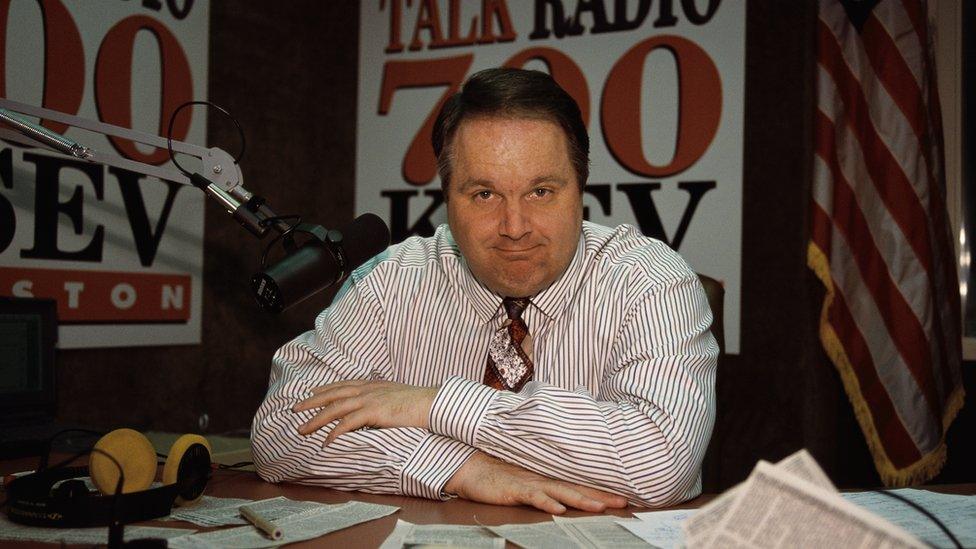
Rush Limbaugh polarised America and reshaped its political landscape
Just a few months after Republicans assumed power in January 1995, a right-wing militant detonated a truck bomb outside a federal building in Oklahoma City, killing 168 people, including 19 children.
Clinton pointed blame at right-wing radio for fomenting anti-government anger.
"They spread hate," he said. "They leave the impression that, by their very words, that violence is acceptable."
The president did not mention Limbaugh by name, but the message was clear - and Limbaugh fought back. It was just the beginning of the blowback the radio star would face from the left for his sometimes overheated words and penchant for flirting with controversy.
Democratic politicians would denounce him. Liberal pundits like Al Franken would pen books with titles like Rush Limbaugh Is a Big Fat Idiot, to ridicule him. But his legion of fans would always stay loyal.

On race
'The media has been very desirous that a black quarterback do well. There is a little hope invested in McNabb, and he got a lot of credit for the performance of this team that he didn't deserve' (2003)
If Limbaugh was loved by his listeners and reviled by his critics, his continued dominance of the talk-radio airwaves - with a weekly audience more than 20 million Americans - helped the scope of his media empire, and popularity, to expand. He hosted a television programme, penned numerous best-selling books and had a newsletter with half a million subscribers. He debuted a line of "no boundary" neckties and hawked stuffed-crust pizzas for Pizza Hut.
He reached perhaps the pinnacle of his crossover appeal in 2003, when the ESPN cable sports network hired him as a studio analyst for its Sunday football preview programme. Limbaugh, who dabbled in sports media in his younger days, called the job the "fulfilment of a dream".
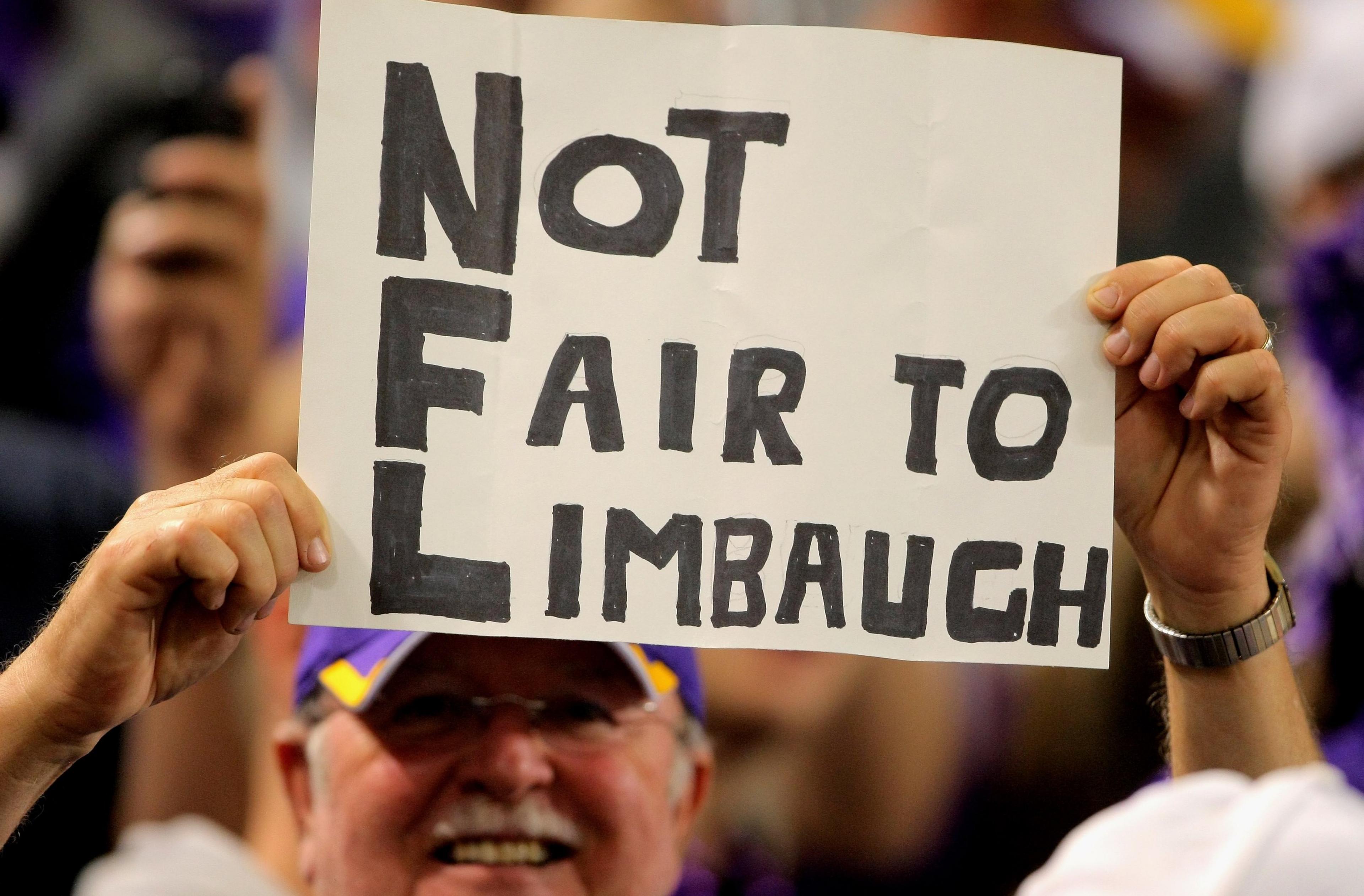
Limbaugh fan with sign against the National Football League
The stint only lasted four weeks, however, as Limbaugh's derogatory remarks about McNabb prompted widespread outcry in the sports world and beyond, as previous controversial comments on race relations were given another airing .
A few days later, Limbaugh announced he was talking a break from his radio programme to deal with an addiction to pain medication after back surgery.
He would return to the air in five weeks, but he never again approached the kind of widespread popular culture visibility he had earlier in his career.

On Sandra Fluke
'What does that make her? It makes her a slut, right? It makes her a prostitute' (2012)
With the Obama presidency, Limbaugh returned to the familiar position of leading a right-wing resistance to the liberals in power.
He had flirted once again with racial controversy when he described Obama as a "rookie whose only chance of winning is that he's black" - a statement remarkable similar to the sentiment he expressed about football star McNabb.
Racial grievance - the idea that minorities were getting special treatment over white Americans - was a theme that carried throughout Limbaugh's career.
The other prominent current in Limbaugh's politics was a criticism of outspoken liberal women, and Limbaugh once again touched that live wire with his attack on Sandra Fluke, who had testified before Congress in February in support of government mandated that private insurers provide coverage for birth-control pills and other contraceptives.
Limbaugh mocked what he characterised Fluke's sexual promiscuity, and he once again used the term "femi-Nazi" - which he had in earlier years said he had abandoned.
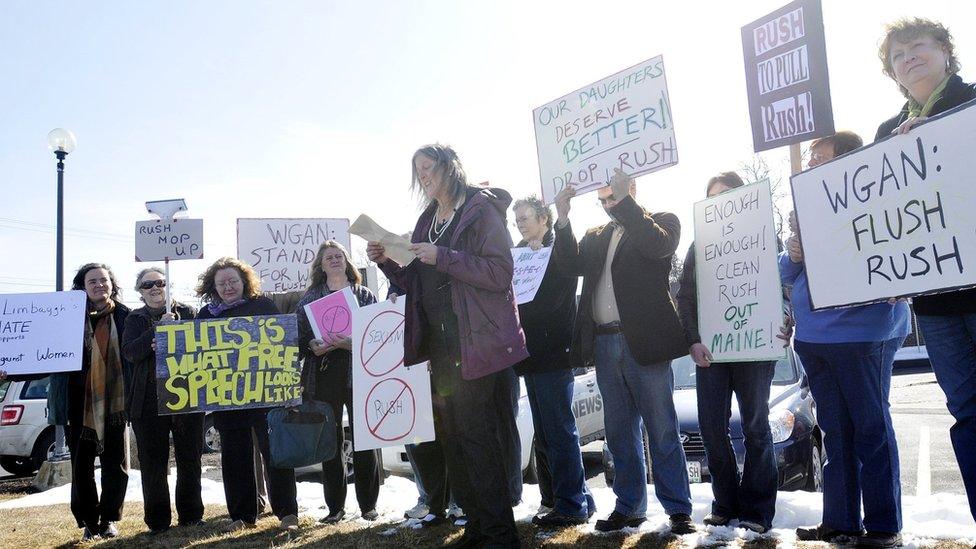
Protesters fought to get Limbaugh off the air in 2012
"So, Ms Fluke and the rest of you femi-Nazis, here's the deal," he said. "If we are going to pay for your contraceptives, and thus pay for you to have sex, we want something for it, and I'll tell you what it is. We want you to post the videos online so we can all watch."
After some of Limbaugh's corporate sponsors pulled their support and President Obama publicly called Ms Fluke and sided with her, the host offered a rare on-air apology.
"My choice of words was not the best, and in the attempt to be humorous, I created a national stir," he said. "I sincerely apologise to Ms Fluke for the insulting word choices."
Some of Limbaugh's advertisers never came back.

On Trump
'If you look at the coalition Trump has put together, it is everything that the Republican Party claims they want, and they don't want it with Trump in charge of it' - (2016)
Rush Limbaugh, in death, is being heralded as the man who paved the way for Donald Trump's political rise. The radio host's confrontational, sometimes derisive, style rhetoric, his embrace of hot-button cultural issues over staid policy debates, his connection with working-class whites alienated from the governing elite all have direct parallels with the former president's brand of politics.
Trump essentially acknowledged the debt he owed Limbaugh by awarding him the Presidential Medal of Freedom during his State of the Union address last year.
Allow X content?
This article contains content provided by X. We ask for your permission before anything is loaded, as they may be using cookies and other technologies. You may want to read X’s cookie policy, external and privacy policy, external before accepting. To view this content choose ‘accept and continue’.
"Thank you for your decades of tireless devotion to this country," Trump said.
It's ironic that Limbaugh, who would help energise two of the most powerful conservative grassroots movements of the past three decades - the first in the mid-1990s and the second the Tea Party protests of 2010 - was not an early supporter of Trump's. He questioned his conservative credentials and doubted his political acumen. He initially supported Senator Ted Cruz of Texas.
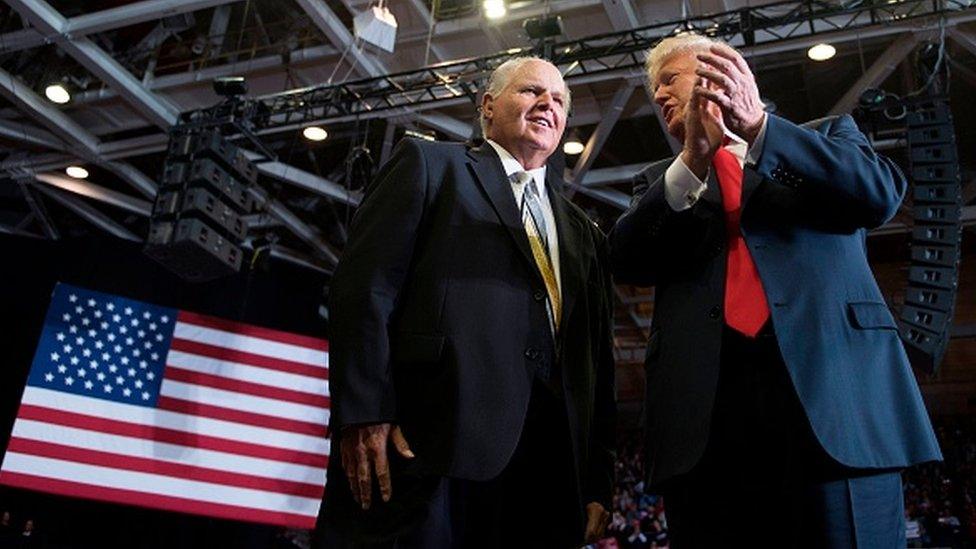
Limbaugh was consistently supportive of Donald Trump
In the end, however, Limbaugh came around to embrace Trump and see the powerful anti-establishment populist force that he had assembled. In 2020, he wholeheartedly endorsed Trump's re-election and echoed the president's repeated attacks on the electoral process.
"You are the one that true American patriots have invested their hopes for their future and their kids' future in," Limbaugh told Trump during an October interview shortly after the president returned to the campaign after treatment for Covid-19. "You are the person they are depending on to stave off this attack on our country that is coming from inside."
Limbaugh's voice may have been silenced after more than four decades on air, but he had passed his rhetorical torch to the man in Mar-a-Lago.